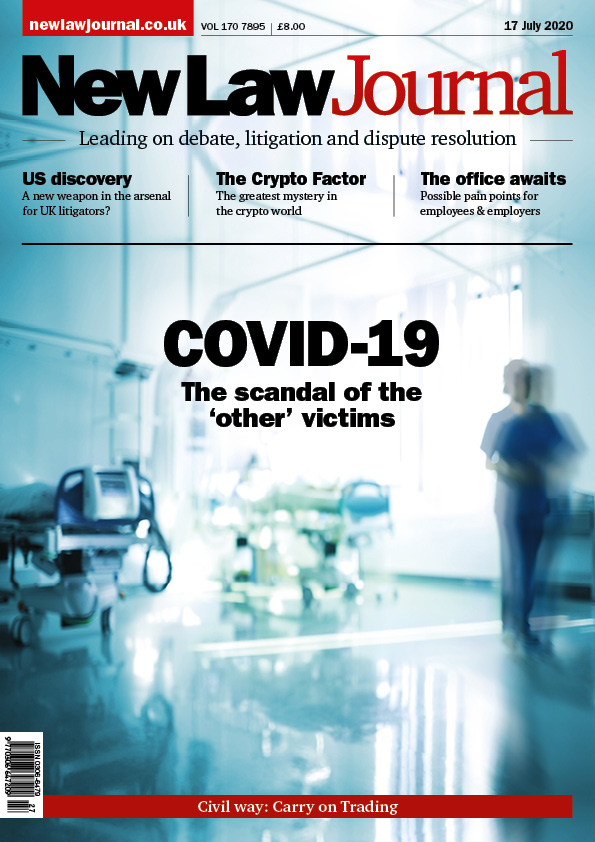THIS ISSUE

It’s time to break bad habits, and remote working provides the perfect excuse, writes Ken Young, Keoghs partner, in this week’s NLJ
The costs of budgeting and costs management do not include VAT, the Senior Costs Judge has held in an important decision for costs lawyers
A global project to improve the mental wellbeing of lawyers has been launched by the International Bar Association (IBA), as COVID-19 adds to the stress of professional life
Two-thirds of barristers would find extended court operating hours ‘an impossibility’ due to caring responsibilities or because they are themselves vulnerable during the pandemic, the Bar Council has warned
Some people love working from home and others hate it―whatever the situation, employers need to make sure they’re prepared for legal issues that may arise when workers return
Institute urges government to make the change permanent
The NHS's focus on COVID-19 is having a 'significant and worsening' impact on non-COVID patients, a QC has warned
Jury trials were due to resume at Durham, Chester, Bolton, Snaresbrook, Inner London and Leeds Crown Courts this week, following health and safety assessments
Living in fear of the taxman? NLJ columnist Stephen Gold offers reassurance in this week’s Civil way―HMRC has updated its guidance to include the impact of coronavirus as a reasonable excuse for late payment
The Justice Committee has launched an inquiry into the Coroner Service and whether enough improvements have been made since reforms were introduced by the Coroners and Justice Act 2009
MOVERS & SHAKERS

NLJ Career Profile: Ken Fowlie, Stowe Family Law
Ken Fowlie, chairman of Stowe Family Law, reflects on more than 30 years in legal services after ‘falling into law’

Jackson Lees Group—Jannina Barker, Laura Beattie & Catherine McCrindle
Firm promotes senior associate and team leader as wills, trusts and probate team expands

Asserson—Michael Francos-Downs
Manchester real estate finance practice welcomes legal director
NEWS
Children can claim for ‘lost years’ damages in personal injury cases, the Supreme Court has held in a landmark judgment
The Supreme Court has drawn a firm line under branding creativity in regulated markets. In Dairy UK Ltd v Oatly AB, it ruled that Oatly’s ‘post-milk generation’ trade mark unlawfully deployed a protected dairy designation. In NLJ this week, Asima Rana of DWF explains that the court prioritised ‘regulatory clarity over creative branding choices’, holding that ‘designation’ extends beyond product names to marketing slogans
From cat fouling to Part 36 brinkmanship, the latest 'Civil way' round-up is a reminder that procedural skirmishes can have sharp teeth. NLJ columnist Stephen Gold ranges across recent decisions with his customary wit
Digital loot may feel like property, but civil law is not always convinced. In NLJ this week, Paul Schwartfeger of 36 Stone and Nadia Latti of CMS examine fraud involving platform-controlled digital assets, from ‘account takeover and asset stripping’ to ‘value laundering’
Lasting powers of attorney (LPAs) are not ‘set and forget’ documents. In this week's NLJ, Ann Stanyer of Wedlake Bell urges practitioners to review LPAs every five years and after major life changes






